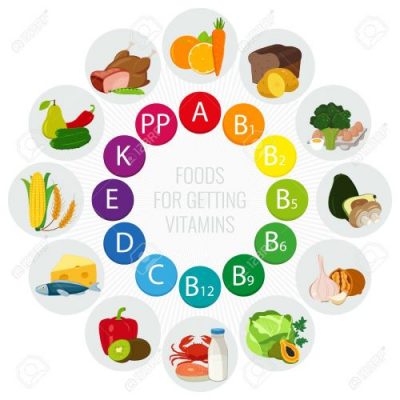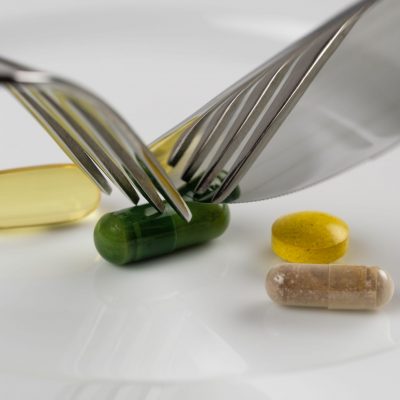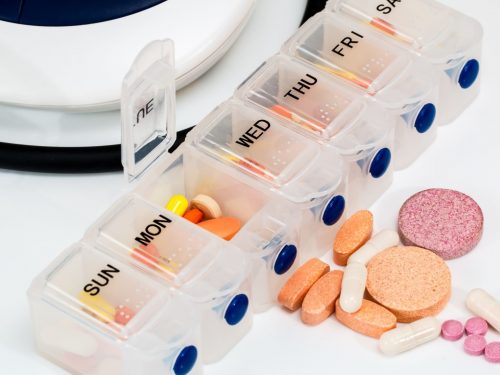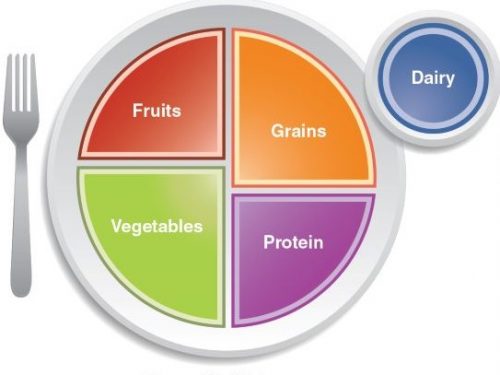Life’s Vital Minerals & Vitamins
One missing piece of the puzzle can make your health and happiness fall like dominoes.

The first thing you need to know is that vitamins and minerals are part of hundreds of vital functions throughout your body. When one of those functions is offset by a lack of a complete vitamin and mineral complex, the body health starts to fall like dominos. In the effort to combat the imbalance of either not enough or too much, you need to evaluate yourself and take an audit of your diet while also looking at some other parts of your health that effects how your body functions.
This article is written to highlight the essential needs of vitamins and minerals for good health and happiness and how to get a well-balanced supply of them. Bye, the time you will have finished reading this article you will have a clearer picture of what types of foods contain what vitamin & minerals and how to manage a program that best fits you and your lifestyle. You will also become more aware of warning signs when you don’t get enough.
Here’s a list of “Must Know” you must consider when optimizing your Mineral and Vitamin needs for a healthy life.
- Are You Missing That Piece of the Puzzle in Living a Healthy Life?
- 12 Symptoms of Vitamins & Minerals Deficiency to Watch Out For
- The Difference Between Minerals and Vitamins
- What’s Essential “13 Essential Vitamins and 16 Essential Minerals”
- We Need Metals in Or Bodies to Be Healthy Yes, that is why they are called “Precious Metals”
- Water- and Fat-Soluble Vitamins
- How Can We get Some? Or How Can we get Enough?
- Multivitamin and Multimineral Supplements
- Natural Sources of Vitamin and Minerals
- All Sounds Good But You have to Be Safe
- Is Diet Enough?

Essential Nutrients For Your Body
There are over 30 essential vitamins & minerals that are racing around your body like techno bots on the internet. Collecting and communicating information to all parts of your body as well as being building blocks for your organs, bones, skin, joints, literally playing a part up every piece of your body. These are not only essential but vitally important to sustaining life.
Your body depends on getting these 30 vitamins and minerals through a well-balanced diet. The body can not produce enough alone and as you get older it gets even harder. Imagine it like a 12-string guitar, it has to be tuned perfectly to bring music to your body. Essential to the immune system, healing, strengthen bones, process thought and memories, and keep that heart pumping full of energy.
ARE YOU MISSING THAT PIECE OF THE PUZZLE TO LIVING A HEALTHY LIFE?
We decided to put this part of this article in the front so you can first understand how bad your health can get when you’re missing one or many essential vitamins and minerals. This is a serious part to pay attention to because not meeting your body’s needs can lead to disease, sickness of all types, mood disorders, anxiety, and many other health issues.
Short List of Problems that can arise from Lack of Vitamins and Minerals
 Vitamin A Causing Visual and Skin Problems.
Vitamin A Causing Visual and Skin Problems.
Vitamin B12 Anemia
Vitamin D Bone abnormalities especially when very young and when you get old
Vitamin E Neurological problems both short and long term
Vitamin K Blood clotting problems which lead to the heart of the health of it all
Vitamin C Scurvy Comes from a lack of fruit and vegetables
Iron Anemia
Imbalanced Digestive Fluids leading to stomach cancer and other problems like colon cancer.
Blindness Which might sound drastic, but a lack of Vitamin A has been known to be a major factor in blindness in some developing countries.
Rickets Not enough Vitamin D leads to soft and weak bones that possibly cause deformation. This is where fortified milk has come from and in the US for almost 100 years.
12 Symptoms of Vitamins & Minerals Deficiency to Watch Out For
- Fatigue & Weakness or you are going to Faint
- Lightheaded at certain times
- Feel like Sleeping always of the day, drowsy
- Loss of Hair more than normal
- Out of breath or trouble breathing
- Trouble using the restroom with constipation or abnormal patterns
- Hard to Concentration
- Palpitations in the heart or twitches in the arms
- Feeling down, not motivated, and depressed
- Numbness or tingling in the joints
- Pale Skin
- Abnormal Menstrual Cycle
THE DIFFERENCE BETWEEN MINERALS AND VITAMINS

Vitamin and Minerals differ in two ways even though they are both considered micronutrients.
- Vitamins can be broken down because they are organic
- Minerals being inorganic made up of a chemical structure
Vitamins come into your body through food and other ways. Food that is stored or preserved, exposed to the environment, cooked, can be damage the vitamins before they get into your body because they are organic being fragile.
Minerals on the other hand are made up of chemicals that can find their way easily into your body through food and fluids you consume.
Working together
- Many Vitamins work in coordination with Minerals. For example, Vitamin D allows your body to pick up calcium while consuming food and fluids. Absorbing Iron is promoted by Vitamin C.
- There also can be negative effects such as Vitamin C blocking the body ability to process cooper properly or an iron shortage can be caused by too much manganese
WHAT’S ESSENTIAL “13 Essential Vitamins and 16 Essential Minerals”
Micronutrients are many small amounts of vitamins and minerals that fit in with the other three vital parts of a diet, protein, carbohydrates, and fat. Micronutrients work with those three to process energy.
13 VITAMINS A, C, D, E, K & 8 types of B;
- B1- Thiamin B2- Riboflavin B3- Niacin B5- Pantothenic Acid
- B6- Pyridoxal B12- Cobalamin Biotin Folate/Folic Acid
Vital for:
- Growing Tissues Immune System
- Regulating Metabolism Strong Bones
- Immune system Neutralize Free Radicals
16 MINERALS
- Calcium Phosphorus Potassium Sulfur Sodium Chloride
- Magnesium Iron Zinc Copper Manganese Iodine
- Selenium Molybdenum Chromium Fluoride.
Vital for:
- Bone Health Oxygen Flow Muscles
- Nerve Function Cell Building Balance of Electrolytes
- Blood Pressure Fluid Balance Heart Health
Micronutrients are all found in the 5 food groups foods and maintaining a balanced diet with wholesome nutrient foods you will get most you need.
Calcium and Iron are two nutrients that we can call true pillars of a strong foundation for good health. Calcium serves as the building blocks for the bones and teeth but also maintain those blocks as you get older. Iron supporting the red blood cells which help carry oxygen from the lungs to other parts of the bodybuilding, maintaining and even repairing broken cells.
WE NEED METALS IN OUR BODIES TO BE HEALTHY? Yes that’s why they are called “Precious Metals”
We’re not talking about gold, silver, and platinum but other metals and minerals (metals are one type of mineral) are more important for our health and cannot live without them. Too much or too little of one of those metals will throughout our delicate system upsetting our bodily functions. Essential metals activate enzymes which are vital molecules.
- Chromium maintains blood sugar levels and draws energy
- Copper is a fuel that metabolizes making red blood cells, cleaning up free radicals, and maintaining neurotransmitters.
- Calcium & Magnesium acts as a building block for bones, nails, hair, teeth; activates enzymes throughout the body; which regulate blood pressure; helps muscles function, communication within the nerves, and controls the blood from clotting.
- Iron processes hemoglobin (oxygen-carrying) and myoglobin (protein in muscle cells) Vital for activating enzymes and functioning of amino acids, hormones, collagen, and neurotransmitters.
- Manganese assists in the formation of bones in addition to metabolizing cholesterol, amino acids, and carbohydrates.
- Molybdenum assist enzymes that process and break down toxins and prevents harmful sulfites in the body from building up.
- Potassium works to balances fluids promote a steady heartbeat and to helps muscle function
- Sodium supports a balance of fluids in that assist in sending nerve impulses, and make muscles contract
- Zinc works to avoid blood clots, produce proteins, boost the immune system, DNA and helps healing and cell division
There are Major Minerals and Trace Minerals which both are necessary for good health.
- Major Minerals; calcium, chloride, magnesium, phosphorus, potassium, sodium, and sulfur•
- Trace Minerals; chromium, copper, fluoride, iodine, iron, manganese, molybdenum, selenium, zinc
WATER- AND FAT-SOLUBLE VITAMINS
Water-soluble vitamins are in the water parts of the food you eat. They are absorbed into the bloodstream directly during digestion circulating easily throughout your body. These types of vitamins are controlled by your kidneys and when you have too much of anyone water-soluble vitamin, it is easily flushed out through your urine.
Water-Soluble Vitamins
- B1- Thiamin B2- Riboflavin B3- Niacin B5- Pantothenic Acid
- B6- Pyridoxal B12- Cobalamin Biotin Folate/Folic Acid Vitamin C
These vitamins have lots of work to do and especially important helping find energy found in food, keep tissues healthy, build proteins and multiply cells and metabolize amino acids. Heal together wounds, supports blood vessels, and acts as the foundation for teeth and bones.
You must remember that water-soluble vitamins should be taken every few days as they are easily removed from the body.
Fat-Soluble Vitamins
Fat-Soluble Vitamins are not so easily processed through the body and take more work to get into the bloodstream. They take a complex path through lymph channels in the intestines and many of them are exported by carries in the form of proteins.
Absorption of fat-soluble vitamins is digested through foods that are digested by stomach acids, travel through the small intestine, and then heads down the system. A substance ‘Bile’ is produced by the liver, enters the small intestine where it breaks down the fats which then allows the nutrients to be absorbed into the body. These vitamins are used in all parts of your body with excessive amounts being stored in the liver and fatty tissues where your body can find a reserve when needed.
Fat-soluble vitamins include Vitamin A, D, E, K which keep your eyes, skin, lungs, gastrointestinal tract, and nervous system healthy. Also, build up bones and protect vision. Vitamin E helps your body store vitamin A and without it would have a hard time. Vitamin E also acts as an antioxidant.
Fat-Soluble vitamins are stored in your body for a long time and toxic amounts can build up and happens a lot when you also take supplements. Be aware and careful.
HOW CAN WE GET SOME? Or How can we get ENOUGH?
Multivitamin/Multimineral “MVM” Through Natural Wholesome Foods or Supplements?
Close to half of U.S. adults are taking some form of MVM dietary supplement. Supplements can never replace deriving MVM from the 5 food groups which provide a lot more well-rounded offering of what the body needs to be healthy. A healthy diet also has fibers and other substances that provide benefits that supplements don’t.
At the same time, it is important to understand that regardless of having the most well-rounded diet, certain medical conditions, old age, or access to a good diet can cause deficiencies and many benefits are found in MVM supplements.
Where do Minerals come from?
The body does not make its minerals and only derived from food and fluids. Minerals are located in rocks, soil, and water making it into our food by plants or animals. Plants absorb minerals from the soil and water and animals absorb minerals from eating plants. We absorb them from the eating of both animals and plants.
 A Well-Rounded Diet ‘5 Food Groups” Full of Vitamins and Minerals
A Well-Rounded Diet ‘5 Food Groups” Full of Vitamins and Minerals
Fresh foods contain lots of minerals but on the market today are many processed foods that are fortified with vitamins and minerals like cereal, milk, healthy snacks, and more. Eating a variety of vegetables, beans, fruits, whole grains, lean protein, dairy products, and unsaturated fats you will get the most healthy vitamin and minerals you require.
- Vegetables and legumes/beans
- Fruit
- Grain (cereal) foods, wholegrain and/or high cereal fiber
- Lean meats, poultry, fish, eggs, tofu, nuts, seeds, and legumes/beans
- Milk, yogurt cheese mostly reduced fat
Why is MVM’s so good and where can I find them?
Minerals:
- Magnesium – A vital element for the muscle contractions while naturally relaxing and help smooth muscles, including the intestines. Besides, helping to absorb calcium.
- Found In; Vegetables like spinach, leafy greens, almonds, beans. soybeans, peanut butter, sunflower and other seeds, halibut, whole-wheat bread, and milk.
- Calcium – Vital to bone and teeth health and supporting hair, skin, and nails.
- Found In; Dairy milk, yogurt, tofu, as well as fortified in plant-based kinds of milk like almond and cashew milk.
- Iron – Building muscles naturally and maintaining healthy blood. Responsible for the red color of your blood. Anemia is the name for Iron Deficiency and is associated with autoimmune disorders like lupus.
- Found In; Foods like clams, liver, beans, yams, and spinach. Red meat, cooked soybeans, pumpkin seeds, and cooked lentils. For vegetarians; soybeans, cereal, pumpkin seeds, beans, lentils, and spinach.
- Potassium – An electrolyte (like magnesium and calcium) that keeps your body hydrated and supports good blood pressure.
- Found In; Vegetables and fruits like bananas, citrus, and spinach. Raisins, baked potatoes with the skin, cooked black beans, plain low-fat yogurt.
- Zinc– Good for the immune system, growth of the body, and fertility.
- Found In; Seafood like oysters, vegetables like spinach, cashews nuts, beans, and dark chocolate.
- Chromium- Benefits glucose function sending energy to all cells in your body
- Found In, whole grains, fresh vegetables, and herbs
VITAMINS Naturally
- Vitamin C – plays a vital role in the immune system function also acting as an antioxidant fighting free radicals. Strengthens blood vessels and giving elasticity to the skin.
- Found In, Orange juice, citrus fruit grapefruits, and tangerines, guava, kiwi, strawberries, cantaloupe, red and green peppers, kale, & brussels sprouts.
- B Vitamins- Important to producing energy, the immune system, & absorbing Iron
- Found In, whole unprocessed foods, specifically whole grains, potatoes, bananas, lentils, chili peppers, beans, yeast, and molasses.
- Vitamin B-12 –essentially one of the most important vitamins. It is vital to converting food into energy.
- Found in, beef, chicken, fish, eggs, and fortified breakfast cereals.
- Omega-3 – A fatty acid that supports a healthy cardiovascular system, brain function, and good mood.
- Found in; Found In- mackerel, salmon, fish oil, cold pressed olive oil, flax, pumpkin & hemp seeds, chia, pecans, walnuts, soybeans, eggs
- Vitamin D – For bone & colon health. Generated by the body when out in the sun. Supports nerve, muscle, & immune systems
-
- Found in; Broccoli, egg yolks, cereals, mushrooms, fortified milk & orange juice, fatty fish, yogurt, beef liver, fortified tofu
- Vitamin A – Also known as a carotenoid that helps fight diseases and good for the eyes
- Found In; sweet potatoes, carrots, tuna, leafy dark greens, cantaloupe, winter squashes, bell peppers, pink grapefruit, and broccoli.
- VITAMIN E – Good for Blood circulation and fighting off from free radicals. Further research is still needed whether vitamin E can prevent cancer, heart disease, dementia, liver disease, or stroke.
- Found In; Almonds, sunflower seeds, avocados, spinach, butternut squash, kiwi, broccoli, trout, olive oil, shrimp, tomatoes
- VITAMIN K- Helps the prevention of blood clots, promotes good bone health and wound healing
- Found In: kale, spinach, brussels sprouts, broccoli, cauliflower, and cabbage. Leafy vegetables such as turnip greens, collards, Swiss chard, mustard greens, parsley, romaine, and green leaf lettuce. In smaller amounts; fish, liver, meat, eggs, and cereals.
- Folic Acid – Cell renewal and preventing birth defects in pregnancy. Red blood cell formation is dependent on folic acid and a deficiency is a known cause of anemia in both adults and children
- Found In: dark leafy greens, asparagus, broccoli, citrus fruits, beans, peas, lentils, seeds, nuts, cauliflower, beets, and corn.
ALL SOUNDS GOOD BUT YOU HAVE TO BE SAFE
Taking a daily dose of Multi-Vitamins and Minerals will not pose much health risk for most people. You should be aware of your consumption and stay within the recommended daily by the Food and Drug Administration or the USDA.
If you are taking vitamin and mineral fortified process foods you should read the supplemental fact labels and combine that with your natural intake and try not to exceed the recommended daily value. For more information on safe amounts visit the NIH Office of Dietary Supplements @https://ods.od.nih.gov/factsheets/list-all/
Former and current smokers should be aware as MVM supplements that provide more than the recommended Daily Value as studies have linked high doses with an increased risk of lung cancer.
Excess amounts of vitamin A during pregnancy has been shown to increase the risk of birth defects.
Adult males and postmenopausal women should avoid using iron supplements if they don’t have a deficiency.
Women of childbearing age, pregnant women, preterm infants, older infants, and teenage girls have a greater risk of developing a deficiency. The overuse of iron supplements is a leading cause of poisoning in young children.
Daily Value of MVMs does not typically interact with medications. But be aware If you are taking a blood thinner and talk to your health doctor first.
Essential Vitamins and Minerals
Is A Good Diet Enough?
Vitamins and Minerals are most potent when they come from wholesome foods. You still can have deficiencies, and you may need to take supplements. Do this with caution: ingesting too much of any vitamin or mineral supplement can be harmful.
Your health will determine your vitamin & mineral needs. Be aware of your diet and what is going on with the body and target balanced meals that will enrich your health.
 ...ALWAYS 2-3 DAYS FREE SHIPPING !
...ALWAYS 2-3 DAYS FREE SHIPPING !

 A Well-Rounded Diet ‘5 Food Groups” Full of Vitamins and Minerals
A Well-Rounded Diet ‘5 Food Groups” Full of Vitamins and Minerals
